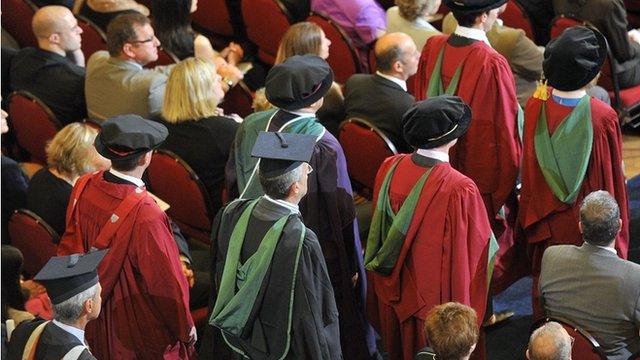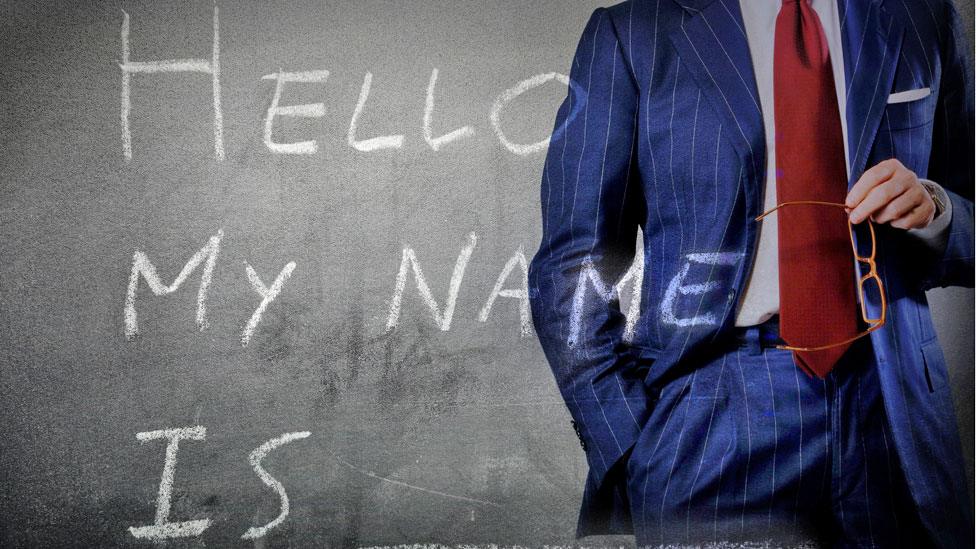'Don't say my name wrong at graduation'
- Published

We've all had that social trauma of the name that looks ominously tricky to pronounce.
You're at some event and you've got to introduce someone - or you're trying to read from a name badge - and there's that rising tide of embarrassment as you head into a thick forest of consonants.
You have a few goes at it, like a nervous horse taking a jump at a big fence, before giving up in a welter of apologies.
Imagine how much worse that would be if there were thousands of people watching and mispronouncing a name could ruin someone's day.
That's the nightmare facing universities in these weeks as they hold graduation ceremonies - with each student having their name read out as they stride across the stage.
Frozen grin
There are halls crowded with proud families, recording each moment on their mobile phones - and the great fear is that the name sounds nothing like it should.
"It can go really badly wrong - and you feel for the parents who might have travelled thousands of miles. You can see their smiles turning to a frozen grin," says Paul Greatrix, registrar at the University of Nottingham.

All the pomp and ceremony can be ruined by a misplaced pronunciation
If people trip over they might be given another chance to walk across the stage, to save their blushes.
But if the pronunciation of the name goes wrong, "there's no escape, the cock-up is there until the end of time," he says.
As universities become more diverse places it becomes an even greater challenge - with names from China, Africa, the Middle East, South Asia, Europe and South America.
Mr Greatrix says universities have been developing their own approaches to preventing mistakes.

And this is... the awkwardness about names is worse on the big stage
"They might get in touch with people to ask how they want their names pronounced," he says. That gives the announcer time to rehearse any unfamiliar names.
"Some institutions might get a linguist," he says or a native speaker, if there is uncertainty about the pronunciation of names from a particular language or culture.
Mr Greatrix, who is a contributing editor to the Wonkhe higher education website, external, says graduations are great optimistic events.
But he says there are nagging worries for anyone involved that it might be spoilt by a horribly wrong pronunciation.
Record your name in advance
Even with names that are not ostensibly difficult there can be problems.
A mistake at Butler University in Indiana in US has been widely shared this summer. It was a classic case of mixing up the first letter of a first name with the first letter of the surname - made trickier when the name was "Julie Kirkhoff".
"Forgive me! 'Kirkhoff'," said the announcer, in case anyone had missed it.
Allow X content?
This article contains content provided by X. We ask for your permission before anything is loaded, as they may be using cookies and other technologies. You may want to read X’s cookie policy, external and privacy policy, external before accepting. To view this content choose ‘accept and continue’.

There have been efforts to use technology to minimise the risk of getting names wrong.
Graduates from Stanford University in California have developed a system called Name Coach, which is used by more than 100 institutions in the US - and also some in the UK.
This has been built to avoid names being "mangled" at graduations. Students are invited to make a recording of their name into a website, which is then rendered into a phonetic form.
This allows the announcer to look through the names coming up and listen to how it should sound and then read a syllable-by-syllable pronunciation.
The example given is Oluwarotimi Adesina - which it renders as O-loo-wa-RO-tee-me Uh-DESH-i-na.
There is also an option for students to specify their preferred gender pronoun.

Graduation should be a time for celebration rather than irritation
It means that the announcer on stage can have as much information as possible to avoid a name-related car crash.
Cultural identity
Princeton University in New Jersey adopted this online recording system this year, saying in particular it would help to "recognise the diversity of its student population".
You only have to take a skim through social media to see how much it matters when it goes wrong.
From the students themselves, many of the reactions are angry and unrepeatable, with great offence being taken about an incorrect pronunciation.
It can feel like a slight against someone's cultural identity as well as undermining their big moment.
From the parents, there is a lot of passive aggressive irritation, from people who have waited to hear their child's name read out, only to hear a rather dodgy approximation.
Graduations have become big symbolic rites of passage for families, and getting the name wrong touches a particularly raw nerve.

More from Global education
The editor of Global education is sean.coughlan@bbc.co.uk